

Things i've found. I'm for truth, no matter who tells it. I'm for justice, no matter who it's for or against. Malcolm X. Time's All-TIME 100 Movies. The List[edit] Method[edit] Richard Schickel and Richard Corliss each independently compiled a list of 115-120 films they judged to be worthy of inclusion and then debated and weighed each choice until they agreed on the top 100.[1] The process took about four months to complete.
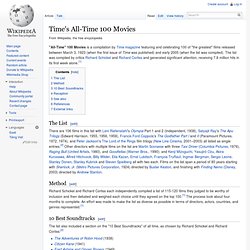
Frequency (film) By saving his father from the fire, John has created a new timeline while retaining his memory of the old.
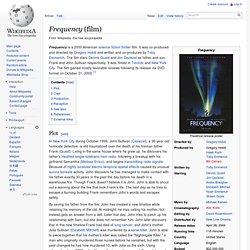
At midnight, he tries calling his mother, but instead gets an answer from a deli. Later that day, John tries to patch up his relationship with Sam, but she does not remember him. John later discovers that in this new timeline Frank had died of lung cancer, and John's mother Julia Sullivan (Elizabeth Mitchell) was murdered by a serial killer. John is able to piece together that his mother's killer was called the "Nightingale Killer," a man who originally murdered three nurses before he vanished, but with the past changed he has now murdered 10, with Julia as the sixth. Using information from 1999 police files on the impending seven killings, John and Frank work together across the gap of time to stop the murderer in 1969 and save Julia and the other six nurses. Frank returns home and repairs the radio, happily telling John that Shepard is dead and Julia is saved.
Amateur radio. An example of an amateur radio station with four transceivers, amplifiers, and a computer for logging and for digital modes.
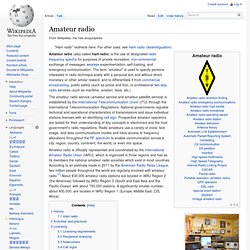
On the wall are examples of various awards, certificates, and a reception report card (QSL card) from a foreign amateur station. Amateur radio (also called ham radio) is the use of designated radio frequency spectra for purposes of private recreation, non-commercial exchange of messages, wireless experimentation, self-training, and emergency communication. The term "amateur" is used to specify persons interested in radio technique solely with a personal aim and without direct monetary or other similar reward, and to differentiate it from commercial broadcasting, public safety (such as police and fire), or professional two-way radio services (such as maritime, aviation, taxis, etc.).
History[edit] An amateur radio station in the United Kingdom. Major depressive disorder. John Hughes (filmmaker) Braid. Kaleidoscope. A woman looks into a large kaleidoscope in San Diego View inside a Kaleidoscope.
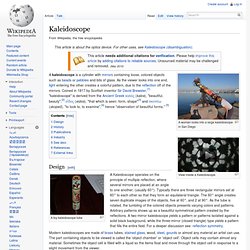
Design[edit] A toy kaleidoscope tube A Kaleidoscope operates on the principle of multiple reflection, where several mirrors are placed at an angle to one another, (usually 60°). Typically there are three rectangular mirrors set at 60° to each other so that they form an equilateral triangle. Aphasia. Aphasia (/əˈfeɪʒə/, /əˈfeɪziə/ or /eɪˈfeɪziə/; from Ancient Greek ἀφασία aphasia meaning,[1] "speechlessness",[2] derived from ἄφατος aphatos, "speechless"[3] from ἀ- a-, "not, un" and φημί phemi, "I speak") is a disturbance of the comprehension and formulation of language caused by dysfunction in specific brain regions.[4][5] This class of language disorder ranges from having difficulty remembering words to losing the ability to speak, read, or write.
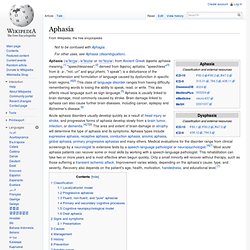
This also affects visual language such as sign language.[5] Aphasia is usually linked to brain damage, most commonly caused by stroke. Brain damage linked to aphasia can also cause further brain diseases, including cancer, epilepsy and Alzheimer's disease.[6] Classification[edit] Classifying the different subtypes of aphasia is difficult and has led to disagreements among experts. Rolleiflex. A Rolleiflex 2.8 F Rolleiflex TLR with 2.8F Planar lens.
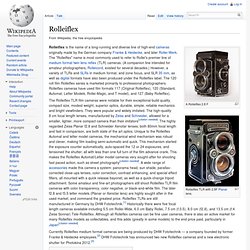
The Decalogue. The Decalogue (Polish: Dekalog, pronounced [dɛˈkalɔk]) is a 1989 Polish television drama series directed by Krzysztof Kieślowski[2] and co-written by Kieślowski with Krzysztof Piesiewicz, with music by Zbigniew Preisner.[3] It consists of ten one-hour films, inspired by the Ten Commandments.[4] Each short film explores one or several moral or ethical issues faced by characters living in modern Poland.
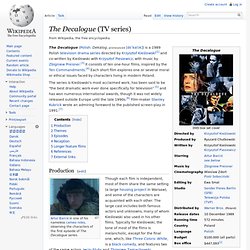
The series is Kieślowski's most acclaimed work, has been said to be "the best dramatic work ever done specifically for television" [5] and has won numerous international awards, though it was not widely released outside Europe until the late 1990s.[6] Film-maker Stanley Kubrick wrote an admiring foreword to the published screen-play in 1991.[7] Artur Barciś in one of his nameless cameo roles, observing the characters of the first episode of The Decalogue series. The ten films are titled simply by number (e.g. Krzysztof Kieślowski. Early life[edit] Kieślowski was born in Warsaw, the son of Barbara (née Szonert) and Roman Kieślowski.[5] He grew up in several small towns, moving wherever his engineer father, a tuberculosis patient, could find treatment.
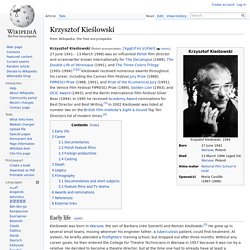
At sixteen, he briefly attended a firefighters' training school, but dropped out after three months. Without any career goals, he then entered the College for Theatre Technicians in Warsaw in 1957 because it was run by a relative. Balenciaga. History[edit] Balenciaga dresses on display in Florence, Italy.
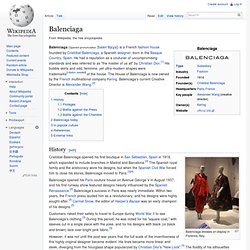
Cristóbal Balenciaga opened his first boutique in San Sebastián, Spain in 1918, which expanded to include branches in Madrid and Barcelona.[3] The Spanish royal family and the aristocracy wore his designs, but when the Spanish Civil War forced him to close his stores, Balenciaga moved to Paris.[3][4] Balenciaga opened his Paris couture house on Avenue George V in August 1937, and his first runway show featured designs heavily influenced by the Spanish Renaissance.[3] Balenciaga's success in Paris was nearly immediate. Within two years, the French press lauded him as a revolutionary, and his designs were highly sought-after.[3] Carmel Snow, the editor of Harper's Bazaar was an early champion of his designs.[5] However, it was not until the post-war years that the full scale of the inventiveness of this highly original designer became evident.
Protégés[edit] Solanin. Story[edit] Meiko and Taneda graduated from university two years ago.
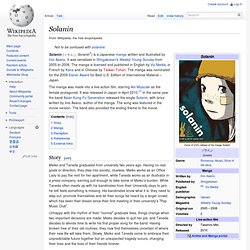
Metaphor. A metaphor is a figure of speech that describes a subject by asserting that it is, on some point of comparison, the same as another otherwise unrelated object. Metaphor is a type of analogy and is closely related to other rhetorical figures of speech that achieve their effects via association, comparison or resemblance including allegory, hyperbole, and simile. In simpler terms, a metaphor compares two objects/things without using the words "like" or "as". One of the most prominent examples of a metaphor in English literature is the All the world's a stage monologue from As You Like It: This quotation contains a metaphor because the world is not literally a stage.
Córdoba, Andalusia. It has been estimated that in the 10th century Córdoba was the most populous city in the world,[4] and under the rule of Caliph Al Hakam II it had also become a centre for education under its Islamic rulers. Al Hakam II opened many libraries on top of the many medical schools and universities which existed at this time. During these centuries Córdoba became a predominantly Muslim society with minorities living in a restricted second-class status. Today it is a moderately sized modern city; its population in 2011 was about 330,000.[5] The historic centre was named a UNESCO World Heritage Site. The Deer Hunter. The film was based in part on an unproduced screenplay called The Man Who Came to Play by Louis Garfinkle and Quinn K. Redeker about Las Vegas and Russian roulette.
Producer Michael Deeley, who bought the script, hired writer/director Michael Cimino who, with Deric Washburn, rewrote the script, taking the Russian roulette element and placing it in the Vietnam War. The film went over-budget and over-schedule and ended up costing $15 million. The scenes of Russian roulette were highly controversial on release. The film won five Academy Awards, including Best Picture, Best Director, and Best Supporting Actor for Christopher Walken, and was named by the American Film Institute as the 53rd greatest American film of all time in the 10th Anniversary Edition of the AFI's 100 Years...100 Movies list. Thunderbolt and Lightfoot. Quakers. Happening.